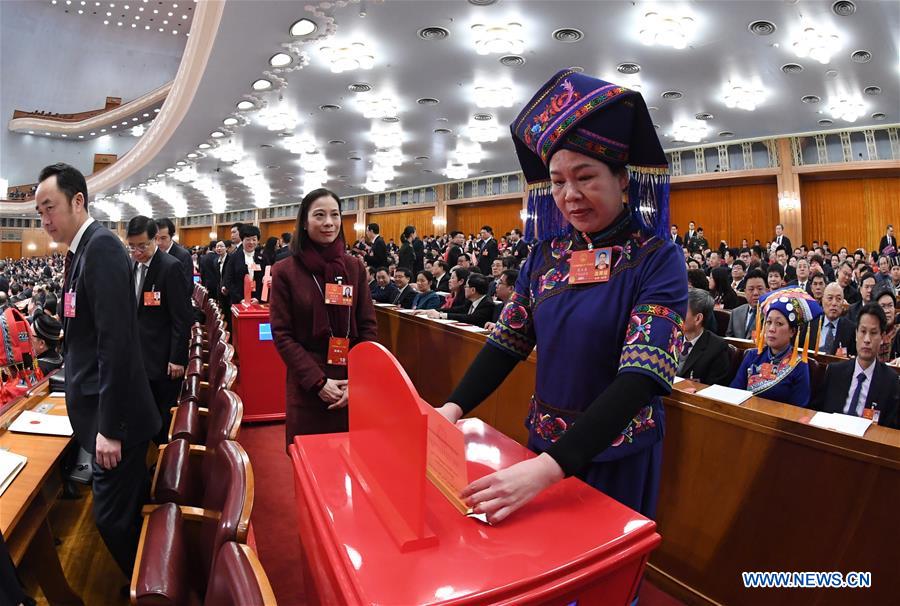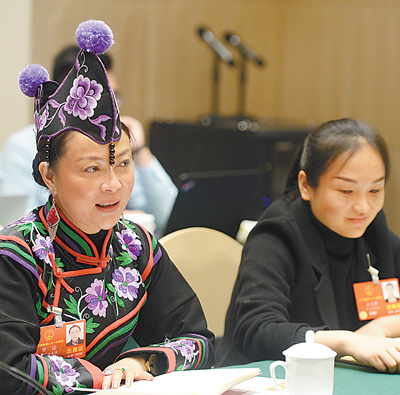


A deputy to the 13th National People's Congress (NPC) casts her ballot on a draft amendment to the country's Constitution at the third plenary meeting of the first session of the 13th NPC in Beijing, capital of China, March 11, 2018. (Xinhua/Rao Aimin)
Revisions to parts of China's Constitution is believed to be a key measure to further modernize China's system and capacity for governance.
Chinese President Xi Jinping, when joining a panel discussion with deputies to the 13th National People's Congress (NPC) from Guangdong province last Wednesday, said that he totally endorsed the draft constitutional amendment.
Revising part of the Constitution is a major decision made by the Central Committee of the Communist Party of China (CPC) from the overall and strategic height of upholding and developing socialism with Chinese characteristics in the new era, stressed Xi, also general secretary of the CPC Central Committee and chairman of the Central Military Commission (CMC).
It is also a major move to advance law-based governance and modernize China's system and capacity for governance, Xi added.
China’s current Constitution was adopted in 1982 and amended in 1988, 1993, 1999 and 2004.
The current draft, proposed by the CPC Central Committee and adopted by the NPC Standing Committee in January, was submitted to the first session of 13th NPC for deliberation on March 5.
The bill enshrines Xi Jinping Thought on Socialism with Chinese Characteristics for a New Era as a constitutional authority and a new guiding theory for the country.
Xi Jinping thought was written into CPC Constitution at the 19th CPC National Congress held last October to realize a unified guiding theory for the whole Party.
The amendment to the country's Constitution translates the Party's guiding ideology is a much needed move for the development of the Party and country, People's Daily said in a commentary adding that the decision would ensure high-level unity among the will of the Party and country as well as the aspiration of the people.
A great unity in thinking is a precondition to guarantee a nation's creativity, cohesion and strong ability, while a country pursuing modernization has to uphold such scientific theory as guidance, the paper explained.
"The leadership of the Communist Party of China is the defining feature of socialism with Chinese characteristics," read the proposal. The addition, an important part of the Xi Jinping Thought on Socialism with Chinese Characteristics for a New Era, was included in the clauses on the fundamental system of the country.
The CPC leadership is not only a basic guarantee for China to secure success in all the revolution, construction and reform fronts, but also a fundamental political principle for scientific socialism, professor Zhu Lingjun with Party School of the Central Committee of CPC said.
The Party's leadership cannot be weakened, but only strengthened, he stressed, adding that the leading status of the CPC must be upheld whenever the fundamental law is revised.

A deputy to the 13th National People's Congress (NPC) from China's Yunnan province speaks during a panel discussion on the draft revision to China's Constitution, March 7, 2018. (Photo: Chen Bin, People’s Daily)
The revisions this time also covered CPC leadership, the president's term of office as well as supervisory commissions. These major institutional designs aim to improve the leadership system of the Party and the country and modernize the country's system and capacity for governance.
The amended term of office can better keep a centralized and unified leadership of the Party, the country as well as the army, People’s Daily praised the new changes in a commentary titled “A major institutional arrangement to ensure Party and country’s long-term stability” published on March 1.
"Such a revision doesn't mean there will be a change in the retirement system of the Party and state leaders or a lifelong tenure for these officials," the paper said, adding that this institutional arrangement is conducive to optimizing the leadership system of the Party and the country.
The NPC is the highest organ of state power in China. Its permanent body is the NPC Standing Committee. The NPC and its Standing Committee exercise the legislative power of the State.

 Award-winning photos show poverty reduction achievements in NE China's Jilin province
Award-winning photos show poverty reduction achievements in NE China's Jilin province People dance to greet advent of New Year in Ameiqituo Town, Guizhou
People dance to greet advent of New Year in Ameiqituo Town, Guizhou Fire brigade in Shanghai holds group wedding
Fire brigade in Shanghai holds group wedding Tourists enjoy ice sculptures in Datan Town, north China
Tourists enjoy ice sculptures in Datan Town, north China Sunset scenery of Dayan Pagoda in Xi'an
Sunset scenery of Dayan Pagoda in Xi'an Tourists have fun at scenic spot in Nanlong Town, NW China
Tourists have fun at scenic spot in Nanlong Town, NW China Harbin attracts tourists by making best use of ice in winter
Harbin attracts tourists by making best use of ice in winter In pics: FIS Alpine Ski Women's World Cup Slalom
In pics: FIS Alpine Ski Women's World Cup Slalom Black-necked cranes rest at reservoir in Lhunzhub County, Lhasa
Black-necked cranes rest at reservoir in Lhunzhub County, Lhasa China's FAST telescope will be available to foreign scientists in April
China's FAST telescope will be available to foreign scientists in April